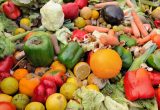How a nationally recommended diet can improve the environment
Changing your diet can improve both your health and the environment. A new study shows that the national dietary recommendations on reducing animal products can reduce environmental impacts in most high-income nations. Publication in PNAS journal.
It has long been understood that what we eat impacts not only our health but the environment too. Despite this fundamental food-sustainability awareness, almost no national dietary recommendations have been designed with sustainability in mind. Out of thirty-seven countries examined, only 4 nationally recommended diets (NRDs) make any mention of the environmental or sustainability impacts of diets.
Environmental gains
Although sustainability is generally overlooked in preparing NRDs, these recommended diets may still be beneficial for the environment, as they often suggest reductions in meat and other foods with high environmental impacts. Researchers at the University of Leiden have gathered details of NRDs for 37 nations worldwide, and have investigated their impacts on carbon emissions, water quality, and land use. They compared these impacts to the impacts of average diets consumed in each of the nations involved, to determine if following a nationally recommended diet would have a lower environmental impact than the average national diet currently consumed.
The study shows that choosing to follow an NRD over the average national diet would have the biggest environmental savings in the United States, Australia, Brazil, and Canada. Most of these savings are due to the reduction of meat in the diet. There are reductions also in most EU nations, with Greece, Ireland, and the Netherlands saving the most.
In lower-income nations, following an NRD over the average national diet could result in slightly higher environmental impacts. This is generally because guidelines in these nations emphasize a higher consumption of animal products to combat low levels of protein in the diet.
Improving the guidelines
Given that the most NRDs don’t mention sustainability we can almost certainly do better. More discussion of sustainability issues, sourcing of sustainable foods, methods for reducing waste, and highlighting the importance of environmental health would improve the guidelines tremendously.
‘Although I think we could do even better, the message is a positive one, overall,’ said Dr Paul Behrens, lead researcher of the article; ‘Especially if middle- and high- income countries modify their diets to align with nationally recommended diets. This will generally mean eating more plant products such as legumes and vegetables, and fewer animal products. If you know your diet isn’t healthy, you have one more reason to change, for our environment too. It might just be possible to have your cake and eat it!’








